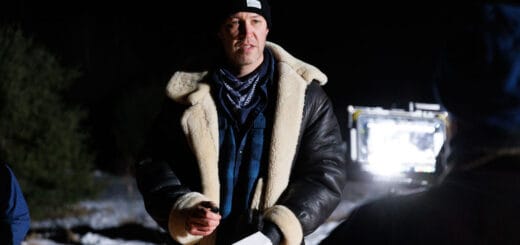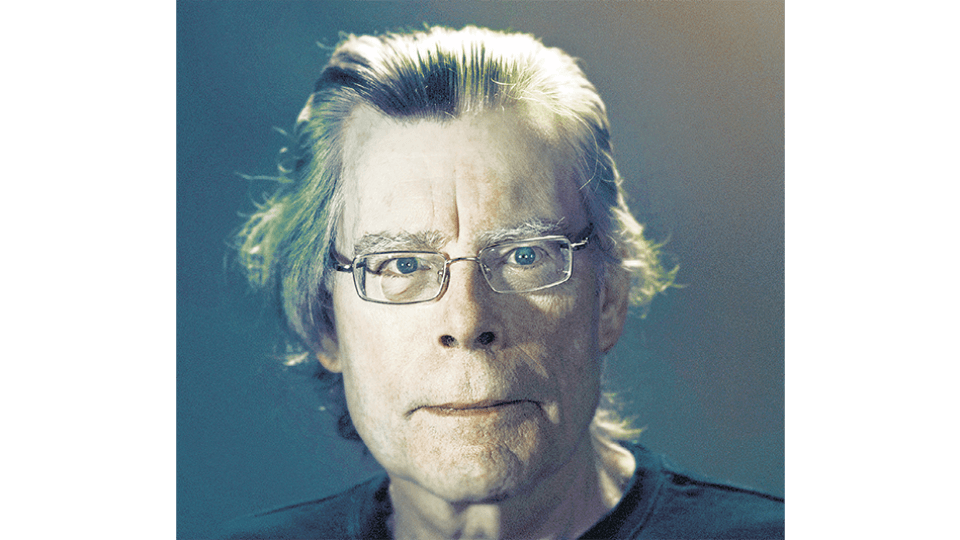Thad Lee
He is the filmmaker of All That You Love Will be Carried Away Dollar Baby film.
SKSM: Could you start with telling me a little bit about yourself? Who are you and what do you do?
Thad Lee: My name is Thad Lee. I write, make films, and take photographs.
SKSM: When did you know you wanted to become a filmmaker?
Thad Lee: I always liked to rhyme. Over time I began writing poems. But my shyness about my work kept me from reading them aloud until I was a senior in high school. That same year I enrolled in a class called Mississippi Writers. The instructor broke us up into small groups for our final project. The assignment was to present a writer we studied to the class however the group wanted. I had wanted to make a film ever since eighth grade when my science teacher took a day off from teaching biology, pulled down a screen before the blackboard, and projected the Big Foot movie he made with his college friends. My parents had a camcorder, and I swayed my group towards making a film. Our instructor was not entirely pleased with Infactuation of Death Among Mississippi Writers, which screened many months late. It had little to do with Mississippi writers, instead focusing on the deaths and afterlives of a Choctaw warrior, a Confederate soldier, and a drugged teen, none of whom had anything to do with any story we had read. It also had a misspelled title. Still, I loved making it.
SKSM: When did you make All That You Love Will be Carried Away? Can you tell me a little about the production? How much did it cost? How long did it take to film it?
Thad Lee: I received the Dollar Baby rights in the winter of 2017. I began working on the script in early 2018. By the spring I was casting and location scouting. That summer, we traveled to Clarksdale, Mississippi for two days and shot the first part of the story, which establishes the major plot device throughout the rest of the film, the notebook. In King’s story, it is revealed that the Salesman has had the notebook for nearly seven years. I wanted to give Rhes Low, who played the Salesman, time to let his hair dye fade to grey and get a bit out of shape to make the time passage more realistic, so we waited until February of 2019 to film the rest of the film. We went back to Clarksdale for two days and shot in Oxford for five days.
SKSM: How come you picked All that you love will be carried away to develop into a movie? What is it in the story that you like so much?
Thad Lee: When you apply for a Dollar Baby there are a selection of short stories that you can choose from, and they each have a brief summary of work. Although Stephen King is best-known for his horror stories, I did not want to make a horror movie. The summary of “All That You Love Will Be Carried Away” was: A man checks into a Lincoln Nebraska Motel 6 to find the meaning in his life. I was at a point in my life where I could go in several directions. I needed to think it though, make the right choice, and go along that path wholeheartedly. I knew I could put my energy into this story where the stakes were similar.
SKSM: How did you find out that King sold the movie rights to some of his stories for just $1? Was it just a wild guess or did you know it before you sent him the check?
Thad Lee: I was finishing up a MFA in screenwriting at the University of New Orleans, and one day I broke up thesis-writing sessions by driving to a book store. While I was there, I browsed the magazine stand and saw The Complete Guide to Stephen King, which I believe covered every feature film and television adaptation of his work. The Shawshank Redemption article touched on director, Frank Darabont’s first film, “The Woman in the Room.” I learned it was a Dollar Baby and thought the idea of King giving film students a chance to work with his material was interesting and generous.
SKSM: Was there any funny or special moment when you made the movie that you would like to tell me about?
Thad Lee: I really wanted to weave as much of the language and settings from the story into the film as possible, so I was dead set on actually filming in a Motel 6 in Nebraska. I used Google maps to get overlook views. None of them really seemed to match up with the hotel in the story that backs up to a farm. Then I realized all the cast and crew I wanted, with the exception of cinematographer, Matthew Graves, lived in Oxford or Memphis. Paying for their travel for a week in the dead of winter to the Midwest became obviously asinine, particularly for a little film like this one, which had no way of ever making a dime. So, I spent about a week driving to every Motel 6 between Pine Bluff, Arkansas and Pulaski, Tennessee; taking pictures, scouting the landscape, and talking to the people who ran the hotels. The one in Pulaski was a real contender. It backed up to a corn field, and its owner wanted ten rooms booked for a week. He put me in touch with Motel 6 Corporate. They wanted to know if the Motel 6 property, its employees, other guests, or their automobiles would be filmed. I sent them the script and the storyboards, which had the hotel, its employees, and other guests’ automobiles in honest sight. I then sent them a standard location release but never heard back. I was disappointed, but it was really a blessing. It made me look at Clarksdale again. Its flat highways could be Nebraska. Its cornfields may not back up to a hotel, but we could cheat that. So, we did, and found the hotel we needed in Oxford at the University Inn. They let us film in the lobby and in the parking lot with actors screaming at each other in the wee hours. No one seemed to mind. It was perfect.
But the thing I really hated losing more than anything about Motel 6 was its spokesman, Tom Bodett’s line, “We’ll leave the light on for you.” Our story ends with the Salesman’s life depending on whether or not he sees a farmhouse light across a field during a snowstorm. I wanted to work that into the film badly, just on signs on the wall or on No Smoking signs, so I wrote Mr. Bodett, himself, thinking he’d get the story and maybe even wrangle me a little money from Motel 6 themselves to help make the picture. I am sure it was the weirdest email he has gotten in years, and I was surprised not to hear back from him. Well, one night I told my wife, Carlyle Wolfe Lee, I was changing Motel 6 to Hotel 7, and that I needed an advertising line that had light in it, “Something like Hotel 7, a well-lighted place.” She said, “Oh, like the Hemmingway story.” I didn’t know what story she was talking about, so she fetched it from her shelf. I read “A Clean, Well-Lighted Place” later that night and felt a wonderful synchronicity between it and King’s story, for they are both about suicide. So A Clean, Well-Lighted Place became my hotel’s catchphrase. Next I made a crude logo, which insulted Carlyle’s creative sensibilities, so she had mercy on me and re-made it into something any motel chain in the world would be lucky to have.
SKSM: How does it feel that all the King fans out there can’t see your movie? Do you think that will change in the future? Maybe a internet/dvd release would be possible?
Thad Lee: Part of the Dollar Baby Deal is that I had to agree not to publicly screen the film after its one year festival run is over. I believe exceptions can be made, but there has to be written conscent from Stephen King in order for that to happen. It was first screened at the Black Hills Film Festival in South Dakota on February 22, 2020, so I imagine on February 23, 2021, my Dollar Baby will be retired. One of the reasons King started the Dollar Baby was because of the impact films made on him growing up. Making this deal with outsiders was a way to open doors for them that might not be open otherwise, so I am not upset with the restrictions. That is the deal I had to make to be able to work with his material.
SKSM: What “good or bad” reviews have you received on your film?
Thad Lee: So far we have been selected to 41 film festivals and won awards at 26 of them, including many for Best Film and Director. I am pleased that so many of my crew members have been recognized for their work. Matthew Graves has won several awards for his cinematography. Actors Rhes Low and Johnny McPhail both been honored for their acting by many festivals. I am also pleased that our music has won awards for the score as a whole and that Winn McElroy was Best Song for his composition “Jonah” by the Southern Shorts Awards.
SKSM: Do you plan to screen the movie at a particular festival?
Thad Lee: The only one I knew I would screen it at was the Oxford Film Festival, which is where the bulk of the film was shot.
SKSM: Are you a Stephen King fan? If so, which are your favorite works and adaptations?
Thad Lee: Yes, I am a fan of Stephen King and many of his screen adaptations. I love The Running Man, The Shining, Misery, Stand By Me, The Green Mile, and most of all, The Shawshank Redemption, The Dead Zone, Christine, and Carrie.
SKSM: Did you have any personal contact with King during the making of the movie? Has he seen it (and if so, what did he think about it)?
Thad Lee: I had no personal contact with King during the making of the film. I haven’t sent him his copy yet. I will when film’s one-year life is all-but-over. That way I can tell him in a letter how the project fared in the world. And I hope he likes it.
SKSM: Do you have any plans for making more movies based on Stephen King’s stories? If you could pick -at least- one story to shoot, which one would it be and why?
Thad Lee: I have no plans to adapt another King story. But if he likes what I did with “All That You Love Will Be Carried Away” and has something in mind for me to make, I doubt I’d say, “No.”
SKSM: What are you working on nowadays?
Thad Lee: I am working on a feature documentary about married photographers Maude Schuyler Clay and Langdon Clay called Two Lives in Photography.
SKSM: What one thing people would be surprised to know about you?
Thad Lee: I can cook a few good dishes.
SKSM: Thanks for taking the time to answer my questions. Is there anything you want to say to the fans that read this interview?
Thad Lee: I hope you enjoyed reading about the making of the film. I hope some of you make your own Dollar Babies.
SKSM: Would you like to add anything else?
Thad Lee: I would just like to say thank you, Oscar, for being interested in the film and collecting these interviews about all the Dollar Babies. Good luck to you and your hopes.

















